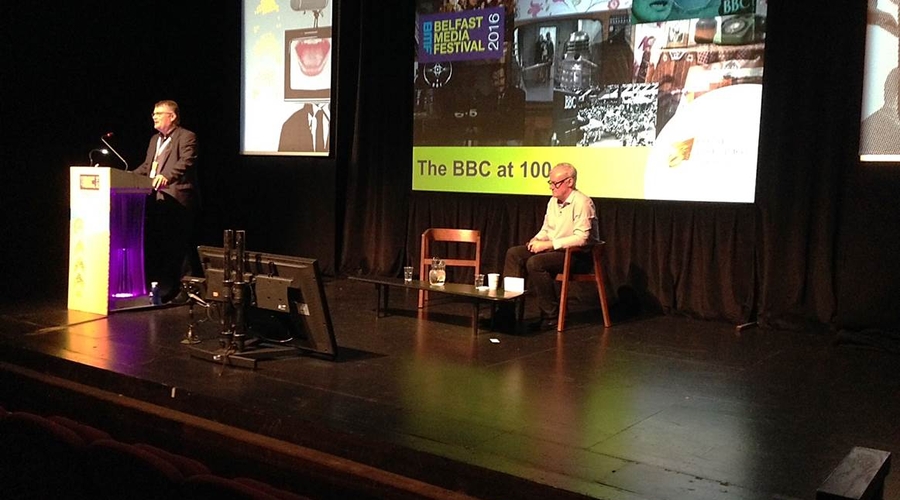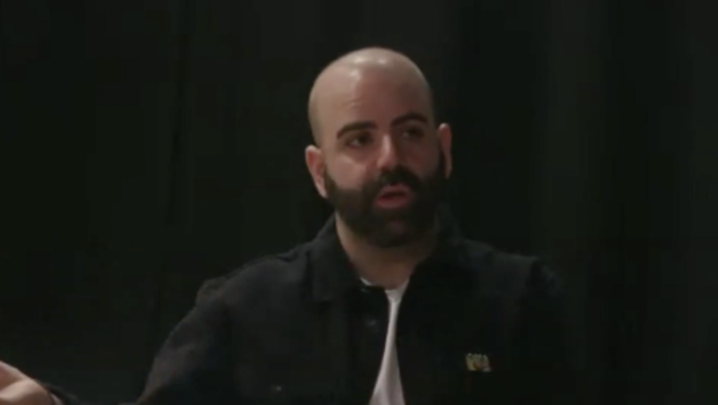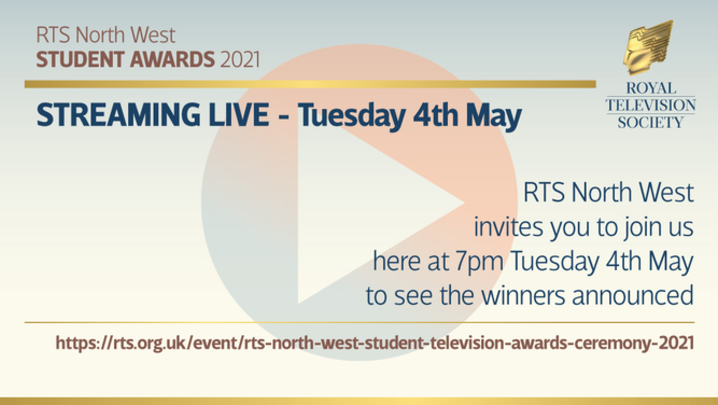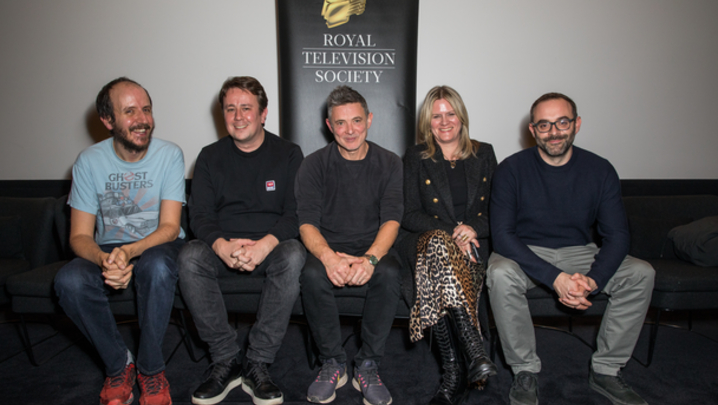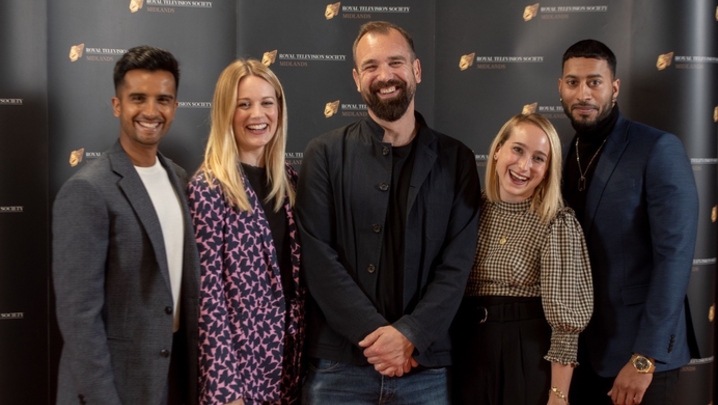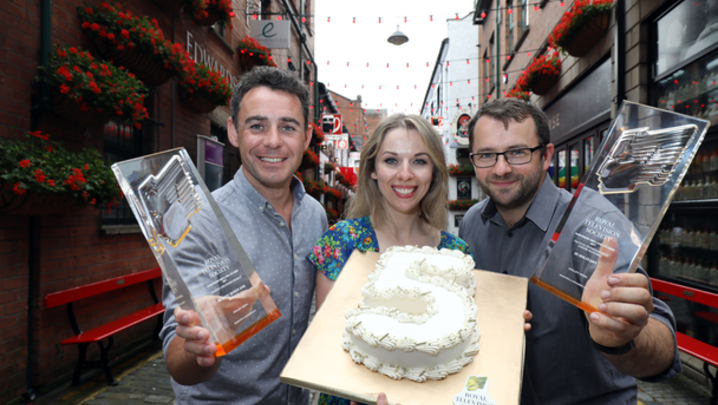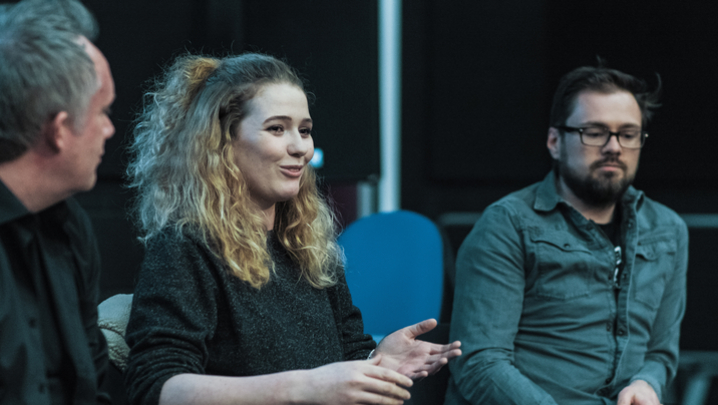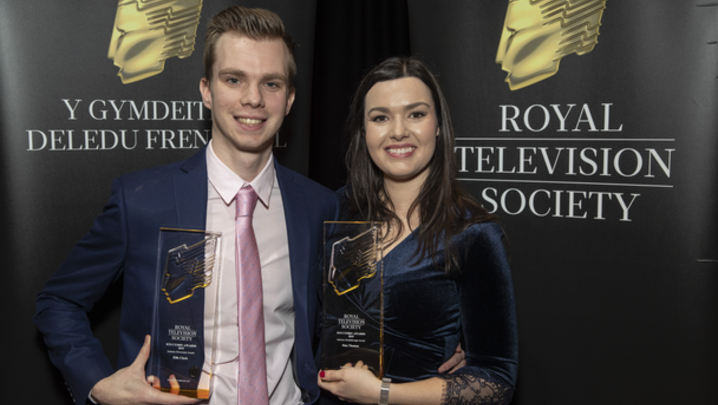Peter Johnston pledged to “mark the 50th anniversary of the start of the Troubles through some landmark and definitive projects” before the BBC’s 100th birthday in 2022.
Projects would include “the full release of our digitised news archive to help all in understanding the past” and “capturing the true stories of that period of our history including the experiences of victims and survivors”.
The Director of BBC NI was giving the Dan Gilbert Memorial Lecture, organised by RTS Northern Ireland, at the seventh annual Belfast Media Festival in mid-November.
“This is a time of opportunity for us in this new Charter period,” said Johnston, who warned of dangers ahead.
“We miss a step in technology at our peril, [and] keeping in tune with audience interests and new audience needs is tougher than ever. We must find and nurture the new talent, but I believe we can rise to these challenges if we work together and continue to think bigger, but with strong local roots.”
“We were delighted that Peter accepted our invitation to deliver this year’s lecture and he delivered a fascinating overview of the broadcasting landscape in Northern Ireland as we head towards the BBC’s centenary,” said RTS Northern Ireland Chair Steve Carson.
The event was held at the Metropolitan Arts Centre (MAC), which also hosted the RTS Northern Ireland Programme Awards.
The annual lecture – the first was made in March 1997 – is given in memory of Dan Gilbert who had a long career in Northern Irish broadcasting with the BBC, including a stint as editor of Radio Current Affairs.
Gilbert was well regarded for the training and mentoring he offered to many leading figures in the industry, including TV presenter Gloria Hunniford.
Previous lecturers have included broadcaster and writer Frank Delaney, former Undertone and head of UK Music Feargal Sharkey, and BBC executives Helen Boaden and Bob Shennan.
Read Peter's speech below:
My talk today is in honour of Dan Gilbert and it is great to have Michael here with us.
I never had the pleasure of meeting Dan, but I know a few who did and they all have a story to tell. He was clearly a unique character and contributed so much to the BBC and to our industry and, in particular, to so many careers of the talented people he helped to nurture. This speech comes at a pivotal time in BBC history as we enter a new Charter period which will take us through to the BBC’s 100th birthday and beyond. In fact the good news of an 11 year Charter timeframe will also take the BBC through to the year in which Dan would also have been 100 – an appropriate symmetry for this occasion.
BBC history is very much in my mind. We have just had the 30th anniversaries of the iconic BBC Radio Ulster programmes Talkback and Across the Line and last year was BBC Radio Ulster’s 40th birthday. From Tyrone Guthrie, who was the first voice of the BBC in 1924 to the opening of the Lisnagarvey transmitter in 1936 by John Reith the BBC’s Director General, the BBC has been intertwined with the history of this place. Let me bring that to life for you.
Lisnagarvery is still in service today, but without all of those massive generators and bits of equipment. It’s amazing to think that the transmitter was going to be built alongside Parliament Buildings at Stormont and that it began its work just as the BBC was about to get a new Charter with the first formal commitment to inform, educate and entertain. Back in 1936 the BBC had just appointed its first Director of Nations and Regions and by the end of that year BBC television had begun and the design (and monies!) had been approved for a new, state of the art Broadcasting House in Belfast. In the decade since then that proud boast about local BBC audiences complaining less than anywhere else hasn’t always held true...
So over the course of this history and with the scale of the technology change you would guess everything is fundamentally changed in our mission to inform, educate and entertain. Well yes and no. When I did a presentation at the Celtic Media Festival in 1998 in Tralee I reported then that Cable and Satellite TV share was 26%, now it is 58% and of course all of our television services are fully digital. At the same time the share of BBC Newsline was 26% in 1998, now it is 29%. BBC Radio Ulster was 21% share then, now it is 21%. In many cases traditional linear viewing and listening has been remarkably robust despite all of the choices and options people now have.
I think one of the reasons why we have maintained this popularity is because we have stayed focussed on true and enduring audience needs. Our services and programme-makers are animated by:
- A sense of public purpose and curiosity exemplified by the best investigative journalism and documentary making as demonstrated so well this year by another iconic BBCNI programme Spotlight
- An aptitude for storytelling and humour – such as the Blame Game
- Impartial journalism forged in the white heat of daily scrutiny and tested so much this year with many divisive issues
- Audience focus and emotional engagement - people and voices over formats as shown in ‘Find Me a Family’ from Eric Starling
However, if you look at Ofcom's latest Communications Market Report for NI, released recently you will see some dramatic statistics. (always good to keep in with the new regulator!) 72% of people in NI now have a smartphone, the highest in the UK. By multitasking adults in NI squeeze 10 hours and 36 minutes media and communications into 8 hours and 40 minutes on a typical day. Of this 44% is spent watching content and with a higher proportion of that than elsewhere viewing live TV. I wonder what Louis MacNeice would make of this? The famous NI poet and BBC producer was once visited by an early version of a management consultant who said to him..." Mr MacNeice I see you only made one programme this year.
Under the bonnet of all of this is a significant variation in the time different audience groups spend with the BBC and the value they attach to that. It can vary from 1.5 hours to 67 hours per week across the spectrum and our biggest concern has to be the, typically younger groups at the bottom end of this continuum and where we must work harder to provide them with the value they deserve. When we scrutinise the media consumption patterns of younger audiences we sometimes tend not to compare like with like. Time spent on many social media platforms may not be displacing more traditional linear content consumption, but actually be a replacement for, or a new way of socialising or chatting. However the time absorbed by and ubiquitous nature of some of these platforms means we need to be present there with compelling and relevant content for those audiences. The TV is often no longer "on in the background", but the smartphone and tablet is.
We are seeking to develop our offer for younger audiences, but there is much more to do. This year we created the new voices slot on BBC Radio Ulster, hosted a younger election debate programme, staged School Choir of the Year and the Young
What were you doing for the rest of the time?" MacNeice paused and said..."Thinking". Those were the days.
Musician Platform award as well as an increasing range of educational initiatives such as School Report, Make it Digital and now Make It.
When I did my first speech at the inaugural Belfast Media Festival in 2010 I called it Thinking Bigger and it is interesting to look back at the challenges and opportunities I identified then and see where we have got to now, before I then look ahead into this new Charter period.
In 2010 I said that the NSR delivery in NI was 1.2% against a target of 2.9%. This year we will achieve 3.1%. Within that there are still gaps. However, the drama story is impressive. We have delivered 2 of the most successful ever BBC2 dramas in the Fall and Line of Duty. The Fall has just finished a successful run a few weeks ago and Line of Duty 4 and a new serial Paula are currently filming in Belfast and last Sunday My Mother and Other Strangers another locally set and filmed series started on BBC1 on Sunday night with over 5 million viewers. Also note some familiar faces including Ryan McParland from Six Degrees in this new major network drama.
Local programmes of strong resonance have been to the fore as never before with some of BBC ONE's highest audiences for True North, Road, Nolan Live and a powerful range of programmes this year marking the events of 1916 where more people engaged with this important output than anywhere else in the UK.
In terms of UK and Irish recognition of our quality look at the achievements. Radio Ulster and Radio Foyle swept the board at the PPIs and most recently Radio Foyle won the UK news award at the Radio Academy ceremony, Stephen Nolan was speech broadcaster of the year and Stephen McCauley won bronze in the UK music broadcaster of the year. Spotlight has now been short listed for RTS UK scoop of the year four times winning twice. We also even won and lost a BAFTA in the same evening.
We thought even bigger for events and landed One Big Weekend and Grayson Perry at Derry/Londonderry City of Culture and of course, one of my career highlights, Sports Personality of the Year from Belfast.
Finally another amazing achievement is the work done on the BBC archive from here in Project Rewind. We already have 25% of the BBC archive digitised and viewable and are on course for full digitisation by the 100th anniversary. Editorial linked to this has had 20m plus audience engagements and it is fitting to have this ambition and passion here as Dan also did as an early mover in protecting our unique archive.
Some great achievements and many more I could have mentioned, but all, in my
view, with a common thread - thinking bigger, but with strong local roots.
We are now embarking on the new 11 year Charter cycle and a five year planning process within the BBC matching editorial ambitions and priorities with the financial model.
At this same event last year I was challenged about BBC Management being complacent about the scale of threat facing the BBC then and I still hear concerns about aspects of the ultimate Charter and Licence Fee outcome and how we got there. I do realise that the devil will be in the detail of how this all unfolds, but let's look at some of the aspects of the new Charter as they apply to Nations and Regions.
There is a new BBC Purpose to “reflect, represent and serve the diverse communities of all the United Kingdom’s nations and regions”and the commitment to serving the needs of audiences in the Nations and Regions is probably the strongest I have seen. There will be an NI non-Exec on the new Unitary Board of the BBC which will now be made up by a majority of independent members and there are various commitments such as to prioritise authentic portrayal and to meet the needs of local audiences around the different parts of the UK. There is a continuing commitment to support the provision of Irish language and the Ulster-Scots output on BBC services in Northern Ireland.
The NI Executive will have a more formal role for the first time in the Annual reporting cycle and in Charter Review and Ofcom will become the BBC’s regulator and will also assess delivery of network portrayal/supply.
The BBC Board will set the BBC strategy and review performance. They will take on accountability to the Licence Payers to act in their interests. In due course we will need to put in place the mechanisms for ensuring we engage with audiences here and elsewhere to understand their needs. There will be various ways to do that from audience research to audience panels to direct engagement, although nothing will ever match my favourite piece of audience feedback. That is many years ago when a gentleman plugged himself into an ECG and sent us the trace to illustrate the effect our radio schedule was having on his heart rate. I recall Gerry Anderson tended to make him peak and of course Gerry would have loved that. We do still miss him.
In terms of the emerging financial model for the period ahead, we know that the overall financial position in taking on the over 75 licence fees will be tough and we will all play our part in continuing efficiency delivery, but we also know that spend on local services in the Nations will be protected and for the first time in quite a while there will be opportunities for reinvestment in local content and services. We also know that the Network supply target of 2.9% of BBC TV spend for NI will continue with more emphasis on portrayal within that. Charlotte Moore described some of her commitments in that regard here yesterday.
This next five year period will be interesting as a number of major cycles are in synch - a new Charter leading to the BBC at 100, a new mandate and Executive at Stormont and a major anniversary period in the history of Northern Ireland. My vision of where we should be by the BBC’s 100th birthday in 2022 is that we will have:
- Marked the 50th anniversary of the start of the Troubles through some landmark and definitive projects including the full release of our digitised news archive to help all in understanding the past and by capturing the true stories of that period of our history including the experiences of victims and survivors
- Created ambitious programming to bring to life the events of 100 years ago as well as leavening the mix by engaging with a new NI generation living in a very different context to any of their predecessors
- Showcased the best of new and emerging talent and properly reflected all that has changed, and is changing in local politics and society
- Continued to make an important contribution to the creative economy in Northern Ireland, providing employment, developing skills, nurturing new talent and ideas;
- Secured our place on the BBC’s networks as matter of routine, and with all of the benefits that this provides not only to local audiences and programme- makers, but also the diversity and appeal of what the BBC does across the whole of the UK and beyond
- Built on the success of our innovative partnership with NI Screen, with other joint initiatives and collaborations across a range of different sectors
- Transformed our provision for younger audiences, including curriculum-based and learning materials that can transform young lives and those of other age groups as well
- Consolidated our reputation as a place of technological innovation-finding solutions to the broadcasting needs of the whole BBC making use of local talents and genius
- Created a building which is the first of a new generation, a truly open space for bringing people together, a showcase of public value created on a daily basis and an iconic and flexible building fit for the next Charter
- ....and people in NI complain less than anywhere else to the new Director of BBC NI, Stephen Nolan...only joking about that bit
This is a time of opportunity for us in this new Charter period. There will of course be challenges. Things get ever more competitive, we miss a step in technology at our peril, keeping in tune with audience interests and new audience needs is tougher than ever, we must find and nurture the new talent, but I believe we can rise to these challenges if we work together and continue to think bigger, but with strong local roots. I hope Dan Gilbert, would approve.

